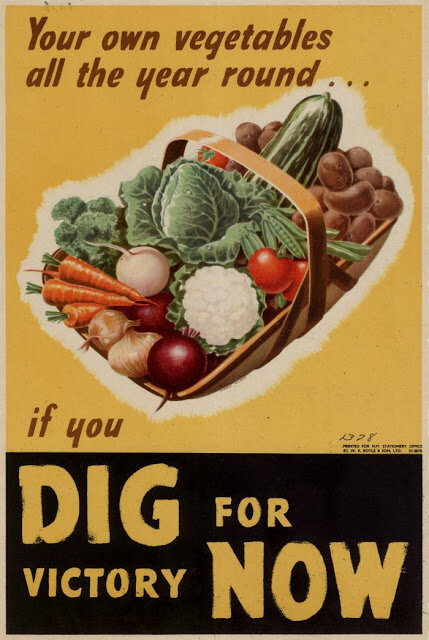Garden for Victory!
The concept of a victory garden has been revived! Thanks to the Covid- 19 pandemic, making trips to the grocery store is at minimum unpleasant and at maximum deadly. As such, people have again started growing food at home. Of course, gardening has been around since the advent of agriculture, but the idea of a Victory Garden hails from World War propaganda. During both World War One and Two allied governments invested in propaganda campaigns encouraging citizens to start gardens. Reasons for this promotion included economic advantages (combating effects of rationing and food shortages), nutritional advantages, as well as benefits to mood and morale. What the government seemed to realize at that time was that growing a garden is beneficial to citizens.
World War II Victory Garden Poster
When there’s less to go around, grow more! The first year one starts a home garden, it’s easy to think, “How on earth is this cheaper than the grocery store?” But year after year the initial investment easily pays itself off. Furthermore, seed saving is a great way to continuously reduce costs. Saving trips to the grocery store isn’t the only benefit of gardening either.
The nutritional benefits of gardening are huge! Instead of getting food that was picked weeks ago, sometimes even months ago, you’re getting the absolute freshest available. Macro and micro nutrients deteriorate in food over time and therefore with some supermarket food you are not getting what you’re paying for. And produce is expensive! Getting fresh veggies from your planter to your table can also affect your microbiome, as home-grown organic foods are often good sources for friendly bacteria that help your gut. How about flavour? Nutritious food tastes good! Anyone who has tried a home-grown heirloom tomato knows it’s superior to a cold stored supermarket version of the fruit. And nutrition isn’t the only factor. In fact, studies of the developing world illustrate this very clearly. In Home gardens: a promising approach to enhance household food security and well being, Galhena, Freed, & Maredia deduced that,
“Multiple social benefits of home gardens include; enhancing food and nutritional security in many socio-economic and political situations, improving family health and human capacity, empowering women, promoting social justice and equity, and preserving indigenous knowledge and culture [20];”
all benefits that would help social issues in any country, not only developing economies.
Urban gardening leaders know that access to gardens and gardening space create better outcomes for neighbourhoods, especially lower income neighbourhoods where good fresh food can be scarce. Xavier Brown, founder of Hustlaz 2 Harvesters, collects food scraps from neighbourhood housing projects that he composts to feed the urban gardens in the neighbourhood. He builds these urban gardens and compost bins in Washington DC. He is adamant that growing your own food is also about preserving culture, “It’s not just about vegetables—we’re building a new way to rebuild neighborhoods,” says Brown. He also encourages the growth of cultural foods, such as fish peppers from the Caribbean, because availability of cultural foods often leads to better health outcomes statistically. Similarly, Ron Finley, the self-titled Gangster Gardener, has fought for urban gardens in some of the lowest income neighbourhoods in LA and works to promote urban gardening and its benefits. On the power of urban gardening, Finley says, “gardening is the most therapeutic and defiant act you can do, plus you get strawberries.” Finley’s approach has been to use normally vacant land, like the space between the sidewalk and the curb, to grow food.
Growing your own food, especially in tumultuous times, is clearly beneficial. It was beneficial enough for the government to run a campaign two world wars in a row. If you have access to backyard space and can grow a garden, you absolutely should! And at the same time, keep in mind that not all of us have access to these luxuries. Promote urban gardening in your community, make it a priority for your local governments or donate to local charities or food banks that are working to help get food to the people who need it. If you’re new to Urban Gardening and it’s benefits, or want to learn more, check out www.ronfinley.com, www.modernfarmer.com or watch me on Sprouts in the City!
Sources:
Finley, Ron. ronfinley.com
Galhena, D.H., Freed, R. & Maredia, K.M. Home gardens: a promising approach to enhance household food security and wellbeing. Agric & Food Secur 2, 8 (2013). https://doi.org/10.1186/2048- 7010-2-8
Paynter, Kevon Black Farmers Reviving Black Roots: ’We are feeding our liberation’
Photo Sources
http://twomenandalittlefarm.blogspot.com/2011/05/victory-garden-poster.html
https://modernfarmer.com/2013/05/12-fantastic-victory-garden-posters/



